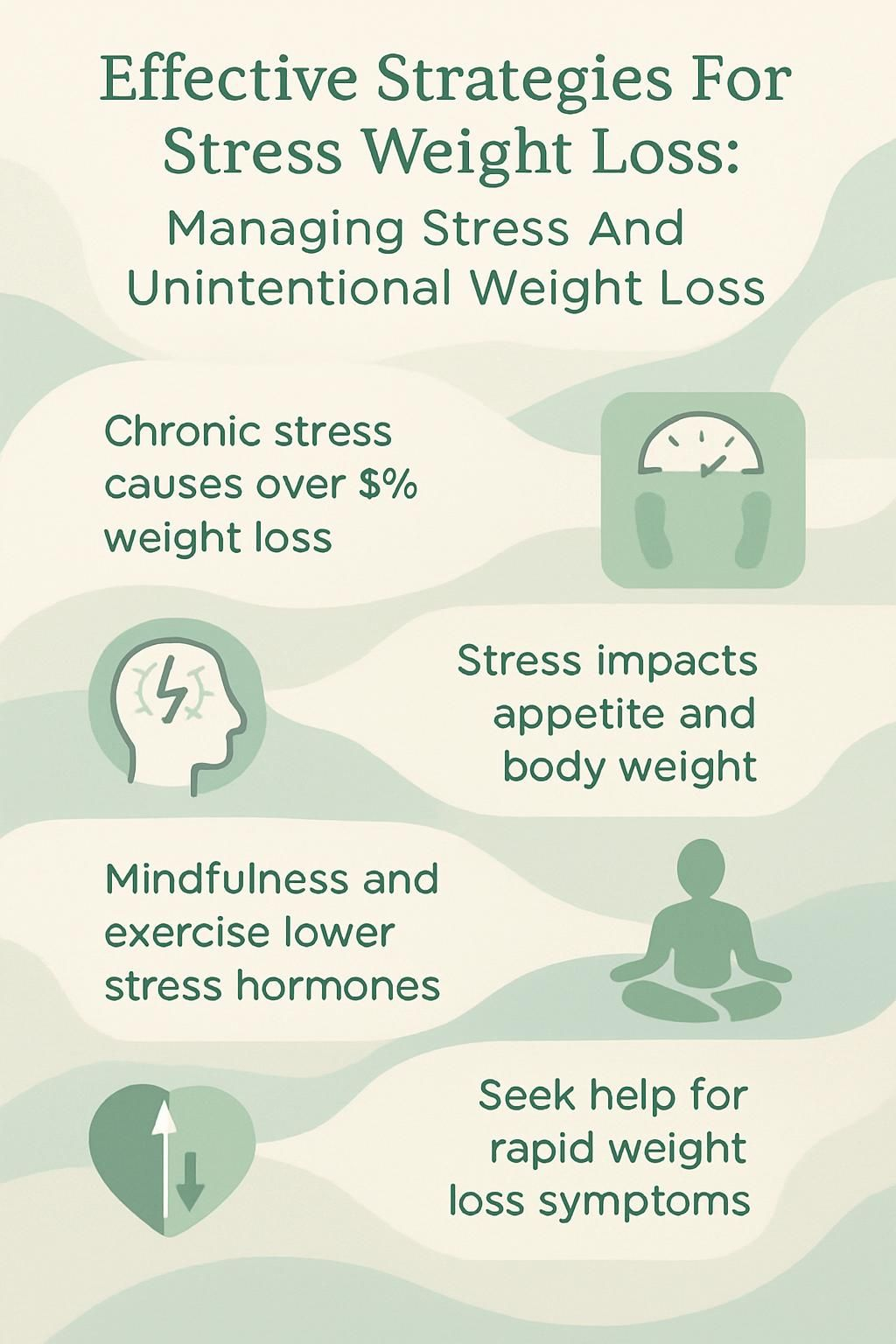Effective Strategies For Stress Weight Loss: Managing Stress And Unintentional Weight Loss
Our Nutrition Assistant AI Suite will transform your body. You will lose fat, get toned, and build muscle. Gain confidence and optimal health.
You may notice weight loss during stressful times, even if your diet or exercise routine stays the same. High cortisol, a stress hormone, can upset digestion and change metabolism, which can lead to unintentional weight loss. Understanding stress and weight loss helps you act early and protect your health.
This guide explains how stress affects your body, the warning signs to watch for, and clear steps to manage stress in healthy ways. Use these practical strategies to feel steady and in control again.
Key Takeaways
- Chronic stress and high cortisol can cause unintentional weight loss. A drop greater than 5 percent in six months is a cause for concern and needs medical review.
- Large surveys, such as a Norway study of 23,557 adults, link stress, anxiety, and depression with shifts in appetite and body weight.
- Helpful strategies include mindfulness, regular exercise shown in Pahk et al. (2020), better sleep habits, nutrient-dense meals, and daily routines that lower stress hormones.
- See a clinician if rapid weight loss comes with fatigue, mood changes, hair loss, or digestive problems that are not tied to diet or more activity.
- Cognitive behavioral therapy can cut chronic stress symptoms by up to 50 percent in about twelve weeks. A registered dietitian can restore steady eating patterns.

How Stress Affects Weight Loss

Stress can change your eating patterns and body weight in quiet ways. Hormones shift, digestion slows or speeds up, and your body may burn more energy than usual.
How Does Stress Impact the Body?
During stress, your body releases adrenaline and cortisol. Adrenaline can mute appetite for a short time. Cortisol can promote belly fat storage and disrupt normal hunger cues.
With ongoing stress, many chemicals surge in your system, including corticotropin-releasing hormone, arginine vasopressin, adrenocorticotropic hormone, corticosteroids, catecholamines, neuropeptide Y, and inflammatory cytokines. These signals raise heart rate and blood pressure and can strain the digestive tract.
Stomach pain, diarrhea, constipation, or heartburn may appear due to stress hyperstimulation. Stress also worsens chronic conditions such as depression, hypertension, atherosclerosis, peptic ulcers, osteoporosis, and obesity.
Research links long-term high cortisol levels with greater risk for serious illness and early death. Weight may fall even when your diet has not changed because these hormones shift how your body uses energy.
What Hormonal Changes Occur with Cortisol?
Cortisol shifts resources to survival tasks and away from digestion and immune function. This helps in a crisis, but it can harm health if it continues too long.
Chronic stress keeps cortisol elevated. This state can push your body toward insulin resistance, which means insulin does not work well to control blood sugar. It may also drive systemic inflammation.
Growth hormone and insulin-like growth factor 1, or IGF-1, also change under stress. Intravenous amino acids can raise growth hormone by lowering somatostatin. In one small study by Pekarovics with 84 adults, a specific oral amino acid mix reduced IGF-1 suppression in high-cortisol states and produced an average 6.5 percent weight loss over 24 weeks. Results like this are promising, but talk with your doctor before using any supplement.
Cortisol also disrupts blood sugar control. High levels can lead to energy crashes or high blood sugar, which both affect appetite and mood. Short bursts of stress may be protective. Long stretches raise the risk for conditions like cardiovascular disease or Cushing’s syndrome.
How Do Eating Habits and Metabolism Change Under Stress?
After cortisol increases, eating habits often shift. Some people skip meals or eat at odd times. Others pick high-sugar or high-fat snacks that spike energy, then cause a crash.
Stress can boost energy use, so you might burn more calories than you eat. Appetite can fade, especially when meals are skipped. If this pattern lasts, unintentional weight loss can follow. Irregular meals and higher energy needs make weight management harder.
Common Causes of Stress-Related Weight Loss
Stress can come from many sources. Physical demands, emotional strain, and life changes can all affect appetite, sleep, and weight.
How Do Chronic Stress and Anxiety Affect Weight?
Chronic stress and anxiety both raise cortisol, which affects hunger and metabolism. The fight-or-flight response often reduces appetite and can lead to skipped meals.
A Norway study of 23,557 adults found strong links between psychological stress, anxiety, depression, and weight changes. Clinicians often use tools like the Hospital Anxiety and Depression Scale to measure how stress affects body mass index and eating patterns.
Sleep problems, fatigue, and digestive issues are also common with anxiety. These symptoms make it easier to under-eat without noticing, which can lead to unintentional weight loss.
Can Sudden Stressful Events Cause Weight Loss?
Acute events such as job loss, divorce, or bereavement can quickly disrupt appetite. Meals get skipped, even comfort foods may lose appeal, and hormones like cortisol and adrenaline surge.
This hormone shift affects hunger signals, metabolism, and how your body absorbs nutrients. Higher heart rate and energy use also increase calorie burn. Sleep loss after a crisis can weaken appetite and speed up weight loss. As you recover, weight often returns, but seek care if symptoms persist.
How Does Poor Sleep Influence Weight Changes?
Stress often leads to poor sleep or insomnia. Studies from the National Sleep Foundation show that high stress is linked with trouble falling or staying asleep.
Sleep loss changes hormones that control appetite and metabolism, including cortisol and insulin-like growth factor 1. Appetite can fade, or you may feel too tired to eat well. Low sleep also drives fatigue, which can add to weight loss during stressful periods.
How to Identify Unintentional Stress Weight Loss
Unintentional weight loss shows up in your routine and how your clothes fit. Spot warning signs early, then act to protect your health.
What Are Signs of Rapid Weight Loss Without Trying?
Doctors consider weight loss greater than 5 percent in 6 to 12 months medically significant, especially without diet changes or more exercise. Signs include:
- Clothes fit looser while your eating and activity stay about the same.
- Body weight drops by at least 5 percent within six to twelve months, showing loss of stored fat.
- Friends or family say you look thinner or ask about your weight.
- Fatigue or weakness during normal tasks, often from missed meals and low calorie intake.
- New digestive issues like diarrhea, constipation, or stomach pain appear with the weight change.
- Hair thinning, brittle nails, or dry skin suggest your diet is missing key nutrients.
- Appetite falls during burnout or anxiety, and meals are skipped without planning to do so.
- Mood shifts such as irritability, sadness, or nervousness happen along with weight loss.
- Poor sleep and daytime sleepiness show up. Sleep changes can raise cortisol and disrupt weight.
- Chronic conditions like diabetes, Cushing’s syndrome, irritable bowel syndrome, fibromyalgia, or polycystic ovary syndrome can add risk for rapid weight change.
See a clinician for any unexplained weight loss. It can point to a medical issue that needs attention.
Why Does Stress Reduce Appetite or Cause Missed Meals?
Stress raises adrenaline and cortisol. The liver releases glucose for quick energy, which can turn off hunger signals in your brain for a while.
During stressful days, you may not feel hungry or you may forget to eat on time. Acute stress can reduce appetite for hours. With ongoing anxiety, the effect often lasts longer. Daily routines break down and meals get missed, which leads to weight loss and low energy.
What Symptoms Like Fatigue or Digestive Issues Indicate Stress Weight Loss?
Stress affects many systems in the body. These symptoms often appear before you notice the scale change:
- Persistent tiredness even after a full night of sleep, since stress drains energy reserves.
- Stomach pain, heartburn, diarrhea, or constipation, which signal stress on the gastrointestinal tract.
- Lower appetite or frequent missed meals, which can trigger unwanted weight loss.
- Shifts in mood such as irritability, sadness, or anxiety that change your interest in food.
- Weakness or muscle loss from low calorie and protein intake during stressful weeks.
- Digestive problems without another clear cause may point to stress as a key driver.
- Hair thinning that appears with rapid weight loss and poor nutrient absorption.
If several of these signs occur together, it is time to check your weight and review your stress levels.
When Is Stress Weight Loss a Health Concern?
Unplanned weight loss can be a warning sign. Pay attention to speed of loss and other symptoms.
What Does Rapid Weight Loss Over 5% Mean?
Losing more than 5 percent of your body weight within weeks or a few months can signal a health problem. For a 150-pound person, that is over 7.5 pounds without trying.
Quick loss can come with fatigue and muscle weakness. Clothes may feel loose before you notice the scale change. Schedule a visit with your healthcare provider for a full review and a plan to manage stress, food intake, and activity.
What Other Symptoms Like Mood Changes or Hair Loss Signal Concern?
Mood shifts such as irritability, sadness, or anxiety often appear with unexplained weight loss. These changes can reduce appetite and lead to missed meals.
Hair loss is another clear sign. More hair on your pillow or in the shower may show your body is under strain. Frequent infections, fatigue, or digestive trouble can also appear when stress wears you down. If these symptoms occur with weight loss, seek care.
Could Stress Weight Loss Indicate Serious Health Problems?
Yes. Rapid loss over 5 percent in less than six months can signal medical issues such as depression, thyroid disease, cancer, side effects from medicines, substance use problems, or heart, kidney, liver, or lung disease. Hormone conditions like Addison’s disease or undiagnosed diabetes may also be involved.
Chronic infections including tuberculosis or HIV can cause fast weight loss. Digestive disorders like celiac disease, inflammatory bowel disease, or ulcers reduce appetite and intake. If you notice ongoing loss with these signs, get a medical evaluation.
Effective Strategies to Manage Stress and Prevent Weight Loss
Small daily steps can calm your system and support steady weight. Choose a few ideas below and build from there.
How Can Mindfulness and Meditation Help Reduce Stress?
Mindfulness brings your attention to the present moment without judgment. This practice lowers stress hormones such as cortisol and steadies breathing and heart rate.
Mindfulness-based programs reduce perceived stress and support healthy eating patterns. If you tend to overeat or undereat during stress, short daily sessions can help you notice true hunger and stop automatic habits.
Start with five minutes of quiet breathing. Add a short body scan or guided session from a trusted app. Progress often shows up as calmer moods and a more regular appetite.
Why Is Regular Physical Activity Important for Stress Management?
Exercise acts as a natural stress reliever. It raises endorphins, the brain’s feel-good chemicals, and improves focus.
In 2020, Pahk and colleagues showed that a 12-week program of aerobic and resistance exercise in 23 adults lowered stress-related amygdala activity and systemic inflammation. Lower inflammation often means more stable energy and better sleep.
Pick activities you enjoy, such as brisk walking, cycling, or bodyweight training. Aim for at least 150 minutes per week. Consistency matters more than intensity.
How Does Healthy Sleep Support Weight Stability?
Sleep is where your body resets. Good sleep hygiene lowers cortisol and supports steady metabolism.
Insomnia from chronic stress disrupts hormone balance, appetite, and blood sugar. Create a wind-down routine, keep a regular schedule, limit screens at night, and reduce caffeine after noon. Even simple deep breathing before bed can improve sleep quality and next-day appetite.
What Does a Nutrient-Rich Diet Look Like for Stress Weight Loss?
During stressful times, your body needs steady fuel. Build meals with a mix of protein, fiber, and healthy fats to support mood and energy.
- Fruits and vegetables, such as oranges and carrots, provide antioxidants that help reduce inflammation linked to stress.
- Leafy greens offer B vitamins that support the nervous system and reduce tension.
- Whole grains supply complex carbs that boost serotonin, a brain chemical that promotes calm.
- Fatty fish like salmon and tuna contain omega-3 fats that support mood balance.
- Nuts and seeds add healthy fats and minerals that help regulate the stress response.
Eat small, balanced meals every three to four hours if appetite is low. Prep simple dishes in advance to make eating easier when you feel stressed.
What Are Practical Ways to Reduce Stress Daily?
Daily routines lower stress and protect your weight. Try this simple checklist:
- Set a short morning routine. Make your bed and eat a quick breakfast to add structure.
- Choose pre-made grocery meals during busy weeks to get balanced nutrition with less added sugar, salt, and fat.
- Use grocery salad or hot bars for fast, veggie-rich lunches instead of skipping a meal.
- Pick higher-protein breakfasts such as an egg sandwich or breakfast burrito instead of high-sugar pastries.
- Walk outside for 15 minutes. Light movement lowers cortisol and boosts mood.
- Practice five minutes of slow, deep breathing to calm your nervous system.
- Keep caffeine moderate, and avoid it after noon to protect sleep.
- Schedule brief breaks to stretch, stand, and drink water to reduce tension.
- Connect with a friend by call or text and share what is on your mind.
- Shut down screens one hour before bed to support melatonin and better sleep.
Pick two actions to start. Add more as they become habits.
When Should You Seek Professional Help for Stress Weight Loss?
Professional support can stop a small problem from growing. Early care protects both physical and mental health.
When Is Medical Advice Needed for Unexplained Weight Changes?
See your primary care doctor if you lose more than 5 percent of your body weight within 6 to 12 months without trying. Go sooner if you also have fatigue, mood changes, or ongoing digestive issues.
One student I worked with lost weight during finals without changing her diet. Her doctor found significant stress effects and helped her create a plan for sleep, meals, and coping skills. Weight stabilized within weeks.
What Therapeutic Options Exist for Chronic Stress?
Cognitive behavioral therapy teaches skills to change unhelpful thoughts and reactions. Studies suggest CBT can lower anxiety symptoms by up to 50 percent within about twelve weeks.
Group counseling can reduce isolation and provide support for eating challenges. For severe stress or depression, clinicians may add medicines such as selective serotonin reuptake inhibitors. Your care team will tailor an approach to your needs.
How Can a Dietitian Assist with Nutritional Planning?
A registered dietitian can create a plan that meets your calorie and nutrient needs during stress recovery. They review your current intake, suggest easy snacks, and recommend supplements if food alone is not enough.
Small, frequent meals with protein, healthy fats, and complex carbs help restore energy and weight. A dietitian also works with your medical team to monitor progress and adjust goals.
Long-Term Adjustments for Better Stress Management
Long-term habits steady your mood and your weight. Think of them as your daily safety net.
What Daily Stress-Relief Methods Are Effective?
Simple routines reduce stress load and prevent skipped meals. Use this plan:
- Practice mindful breathing in the morning or at night to feel calmer.
- Exercise 30 minutes a day, five days a week. Walking, swimming, or yoga support healthy cortisol levels.
- Plan regular meal times with protein, fruits, vegetables, and whole grains.
- Keep a consistent sleep schedule of 7 to 9 hours to balance appetite hormones.
- Take short movement breaks for stretching or a quick walk outdoors.
- Write in a journal daily to process stressful thoughts and events.
- Connect with friends, family, or a support group on a regular basis.
- Drink water through the day to reduce fatigue and tension headaches.
- Use a guided meditation app for 10 minutes to lower perceived stress.
How Can Building a Support Network Help Manage Stress?
Strong social ties protect against chronic stress. People with reliable support report lower stress and fewer health impacts, according to surveys by the American Psychological Association.
Talking with someone who listens helps you process feelings and stay on track with meals. Short check-ins, even by text, can reduce worry and keep healthy habits going during tough weeks.
Why Is Consistency in Self-Care Important?
Steady routines help regulate hormones like cortisol. Over time, consistent sleep, meals, and stress tools prevent large swings in mood or weight.
Daily actions, such as mindful breathing and set meal times, build resilience. If staying consistent is hard, ask a friend, family member, or clinician to help you stay accountable.
FAQs About Stress and Weight Loss
These quick answers clear up common questions so you can make informed choices.
Is It Possible to Lose Weight While Eating Normally Under Stress?
Yes. Stress can raise cortisol and speed metabolism, which may lead to weight loss even with your usual meals. Some people also digest food differently when anxious, which affects how the body absorbs fuel.
If this happens often, track your weight and appetite for two to three weeks. Bring the notes to your clinician for guidance.
How Long Does Recovery Take from Stress-Induced Weight Loss?
Recovery time varies. Some people regain weight within a few weeks after the stressor eases. Others may need a few months.
Recovery moves faster if you address the cause of stress and follow a plan for sleep, meals, movement, and mental health support. Appetite often improves first, then weight follows.
Are There Supplements That Help Manage Stress and Weight?
Some research explores targeted amino acid blends taken on an empty stomach. These blends can affect growth hormone and IGF-1 pathways that shift during stress. In the Pekarovics study, an oral amino acid mix reduced IGF-1 suppression in high-cortisol states and produced an average 6.5 percent weight loss in 24 weeks without reported adverse events.
Always talk with your clinician before starting any supplement. Products vary in quality and may interact with medicines. Food-first strategies remain the foundation.
Conclusion
Managing stress weight loss starts with awareness. Cortisol and other stress signals can change appetite, digestion, and energy use. Healthy meals, mindfulness, movement, and solid sleep help steady your system and protect weight.
Seek medical advice if you lose more than 5 percent of your body weight quickly or have symptoms like fatigue, mood changes, hair loss, or digestive issues. This article is educational, not a substitute for care from your clinician. With the right plan, you can reduce stress, support well-being, and regain a stable weight.
References: American Psychological Association, Stress in America Survey; National Sleep Foundation, Sleep and Stress; Harvard Health Publishing, Stress and Health; HUNT Study, Norway cohort on mental health and weight change; Pahk et al., 2020 exercise and stress biomarkers; Pekarovics et al., amino acid and IGF-1 study.
FAQs
1. What causes unintentional weight loss during stress?
Stress can trigger hormonal changes that affect appetite and digestion. The body may release more cortisol and adrenaline, which can suppress hunger and speed up metabolism. Research shows that chronic stress often leads to changes in eating patterns and nutrient absorption, resulting in unintentional weight loss.
2. How can I manage stress-related weight loss effectively?
Effective strategies include practicing regular relaxation techniques, such as deep breathing or meditation, and maintaining a balanced meal schedule. Studies suggest that eating nutrient-rich foods at consistent times helps stabilize weight. Seeking support from friends or professionals can also reduce stress and promote healthy habits.
3. What foods help prevent weight loss during stressful periods?
Nutrient-dense foods, such as whole grains, lean proteins, nuts, seeds, and dairy products, support healthy weight maintenance. Data from nutritional studies indicate that meals high in protein and healthy fats can help maintain muscle mass and energy levels during stress.
4. Can personal experience guide stress weight loss management?
Personal stories often highlight the importance of self-awareness and routine. For example, one individual noticed significant weight loss during a demanding work project. By tracking meals, setting reminders to eat, and reaching out for support, they regained lost weight and improved their well-being.
Summary: Stress can cause unintentional weight loss through hormonal changes and altered eating habits. Managing this involves structured routines, nutrient-rich foods, relaxation techniques, and social support. Personal experiences reinforce the value of practical strategies in real-life situations.







